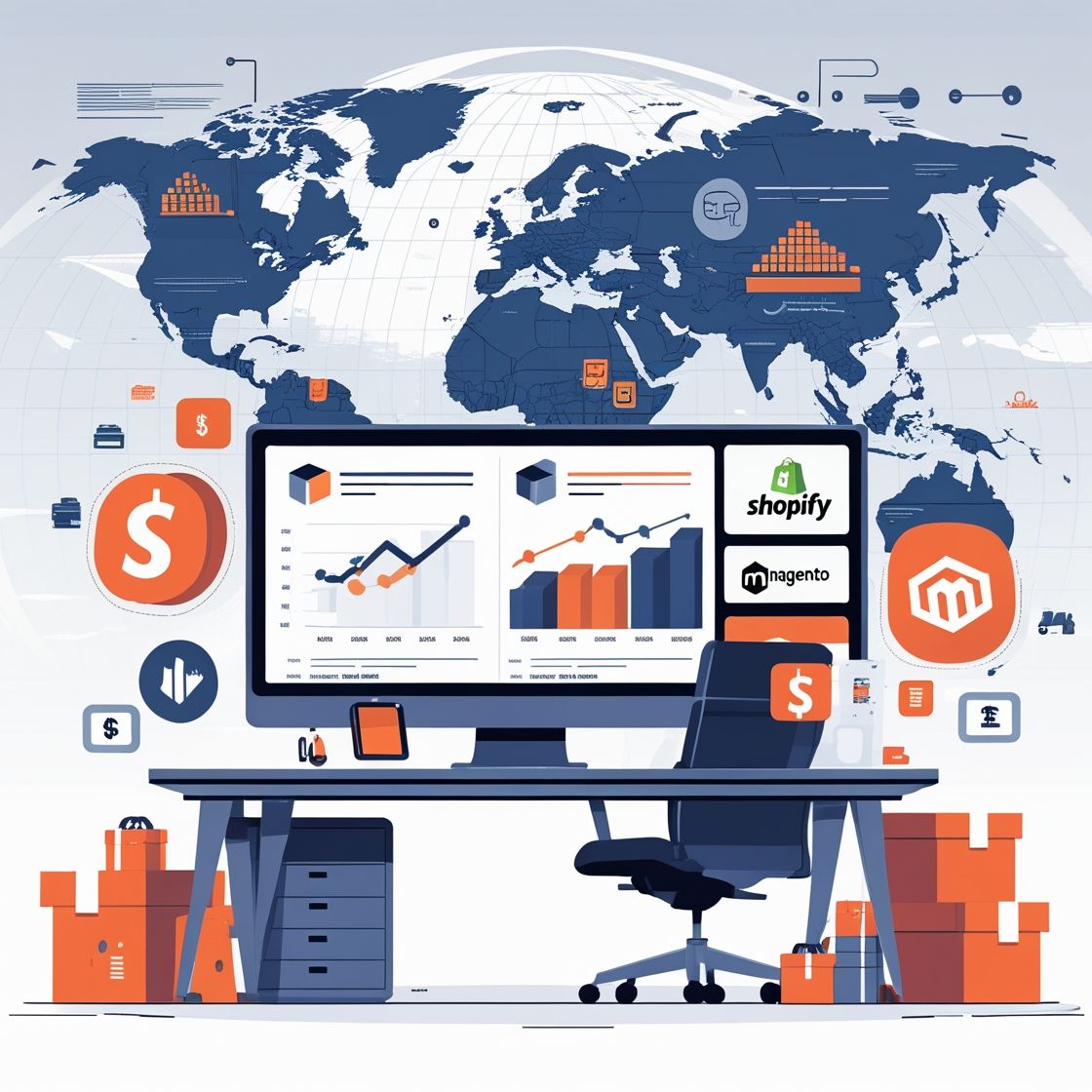-
0 Comments
Table of Contents
Choosing the Best Ecommerce Platform for Small Business: Tips for 2025
Starting an online business in a modern, dynamic virtual landscape is brimming with potential, but it can also feel like navigating a maze. One of the biggest hurdles? Choosing the best ecommerce platform for small business. This essential choice influences the whole thing from your finances and everyday operations to how quickly you can scale and reach new clients. In 2025, with technology evolving hastily, selecting the proper foundation for your online presence is extra vital than ever. We apprehend the demanding situations small commercial enterprise proprietors face – constrained assets, technical expertise, and the desire to make the smartest investment. That’s exactly why we’ve put together this comprehensive guide:
.png?updatedAt=1737136060110)
Choosing the right ecommerce platform is crucial when starting a small business. It forms the foundation of your online store, impacting everything from customer experience to scalability. With so many options available, selecting the best one can feel overwhelming.
Key factors to consider include ease of use, customization options, payment integrations, and cost-effectiveness. Your choice should align with your business needs and future growth plans.
This blog will guide you through the essential criteria for choosing the best ecommerce platform for small businesses. We’ll also review top platforms to help you make an informed decision. Whether you’re looking for simplicity or advanced features, understanding your priorities will lead you to the ideal solution for your store’s success.
Why Choosing the Best Ecommerce Platform for Small Business is Important
Choosing the best ecommerce platform for small business can significantly impact your success. A good ecommerce platform offers several key benefits for small business owners:
User-Friendly Interface: As a small business, you likely don’t have a dedicated tech team. An easy-to-use platform is essential to help you focus on selling rather than getting caught up in complicated technology.
Customization Options: Your store should reflect your brand. The best ecommerce platform for small business will allow you to customize your website’s design and features to fit your unique business needs.
Scalability: Your business will grow over time, and your ecommerce platform should be able to grow with it. The best ecommerce platform for small business should provide you with the tools and flexibility to scale your business as it expands.
Cost-Effectiveness: Small businesses always need to watch how much they spend. The best platform will offer a balance of affordability and functionality to ensure you get the most value for your money.
Key Features to Look for in the Best Ecommerce Platform for Small Business
When searching for the best ecommerce platform for small business, there are several important features to consider. These will help ensure that your ecommerce store is both effective and efficient:
Ease of Use: The platform should be easy to set up and navigate, even if you don’t have technical expertise.
Mobile Compatibility: As more people shop on their phones, your store must be mobile-friendly to provide a seamless shopping experience across all devices.
Payment Integration: A good ecommerce platform should support a wide range of payment options like credit cards, PayPal, and other payment gateways.
Inventory Management: Managing inventory is crucial for small businesses. The best ecommerce platform for small business will include tools to track stock levels, manage orders, and avoid overselling.
SEO Features: Search engine optimization (SEO) helps your store rank higher on search engines, bringing in more traffic. A platform with built-in SEO tools is an important consideration.
Customer Support: Access to reliable customer support is essential. Whether it’s troubleshooting technical issues or getting guidance, the best ecommerce platform for small business should offer responsive support.
Best Ecommerce Platforms for Small Business
Now that we’ve covered what to consider, it’s time to explore the top ecommerce platforms tailored for small businesses. These platforms are designed to simplify online selling, offering user-friendly interfaces, essential tools, and scalability to help businesses thrive.
Ease of use is crucial—look for platforms that don’t require advanced technical skills. Options like Shopify or Wix provide intuitive drag-and-drop builders.
Cost-effectiveness matters too. Evaluate pricing plans and transaction fees to find a platform that fits your budget without compromising features.
Lastly, consider customization and growth potential. Platforms like WooCommerce or BigCommerce offer flexibility and advanced features as your business expands.

1. Shopify
Shopify is one of the leading ecommerce platforms and is often considered the best ecommerce platform for small business. It offers a variety of features tailored to help small businesses succeed online. Some benefits include:
Easy-to-use drag-and-drop store builder
Mobile-responsive templates
Payment gateway integration
24/7 customer support
Shopify is perfect for businesses that want a comprehensive, scalable solution, although it does come with a monthly fee.
2. Wix Ecommerce
Wix is another great option for small businesses, particularly those that want a simple and affordable solution. People like it because it’s easy to use and you can customize it. Key features include:
User-friendly website builder
Customizable templates
Built-in marketing tools like email campaigns
Mobile-optimized designs
For small businesses looking for an affordable yet functional platform, Wix offers an excellent choice and is often praised for being the best ecommerce platform for small business with limited technical knowledge.
3. BigCommerce
BigCommerce is a powerful platform that works well for small businesses planning for future growth. It provides a robust set of features designed to help businesses scale. Some advantages include:
Customizable templates
Advanced SEO tools
Multiple payment options
No transaction fees
BigCommerce’s pricing is a bit higher compared to some other platforms, but it is an excellent long-term investment for growing businesses.
4. Squarespace
If you prioritize design, Squarespace is often considered one of the best ecommerce platforms for small businesses. It offers visually stunning templates that make it ideal for creative entrepreneurs. Features include:
Beautiful, customizable designs
Integrated blogging tools
Easy-to-use inventory management
Secure SSL encryption for safe transactions
Squarespace is perfect for businesses in creative industries such as art, fashion, and photography, making it one of the best ecommerce platforms for small businesses in the creative space.
5. Weebly
Weebly is a beginner-friendly ecommerce platform that’s ideal for small businesses with tight budgets. It offers a simple, intuitive interface and essential ecommerce tools. Features include:
Drag-and-drop store builder
Built-in payment processing
Mobile-responsive themes
Free SSL encryption
For small businesses just starting out, Weebly offers an affordable solution with all the basic features you need to run an online store.
Conclusion
Choosing the best ecommerce platform for small business depends on your specific needs, budget, and goals. Shopify is a great option for businesses that need scalability and robust features, while Wix and Weebly are perfect for those looking for simplicity and affordability. BigCommerce is the preferred choice for businesses on a growth trajectory, while Squarespace is the go-to platform for businesses that prioritize design and artistic expression.
No matter which platform you choose, it’s essential to pick the best ecommerce platform for small business that aligns with your objectives and supports the growth of your business. Consider factors like ease of use, customization options, scalability, and cost-effectiveness to ensure you make the best choice for your online store.
Top Ecommerce Platforms for Large Businesses
Scalability and growth demand a robust ecommerce platform. As your business expands, selecting the right ecommerce platform for large businesses becomes critical. This decision significantly impacts your operations, customer satisfaction, and overall success. Large enterprises require powerful solutions to handle high traffic, manage intricate product catalogs, and support multi-channel sales effectively.
This blog delves into the top ecommerce platforms designed for large businesses, equipping you with the insights needed to make an informed choice for your enterprise.

Why Choosing the Top Ecommerce Platform for Large Business is Important
When you’re running a large business, you need an ecommerce platform that can grow with you. The top ecommerce platform for large business should offer flexibility, scalability, and advanced features to meet the demands of high traffic and large transactions. Additionally, it should integrate seamlessly with your existing systems, provide strong security, and support omnichannel selling.
Top Ecommerce Platforms for Large Business
1. Shopify Plus
Shopify Plus is one of the most popular platforms among large businesses. As an enterprise solution, it offers all the features of regular Shopify with additional tools designed to handle high-volume sales and complex business needs. Shopify Plus provides:
- Scalable infrastructure that can handle large traffic
- Customizable checkout process
- 24/7 customer support
- Integration with numerous third-party apps and tools
For large businesses looking for a user-friendly, yet powerful platform, Shopify Plus is one of the top ecommerce platforms for large business.
2. BigCommerce Enterprise
BigCommerce Enterprise is designed to support large businesses with complex needs. It offers advanced features like multi-currency support, SEO tools, and integration with major ERP and CRM systems. BigCommerce is known for its:
- Highly customizable storefronts
- Advanced product management features
- Seamless integrations with other business tools
- Ability to handle large inventories and high-volume transactions
BigCommerce is ideal for businesses looking for a flexible platform that can grow with them and is among the top ecommerce platforms for large business.
3. Magento Commerce (Adobe Commerce)
Magento Commerce, now part of Adobe, is one of the most flexible and customizable platforms on the market. It is perfect for large businesses that need full control over their ecommerce store’s design and functionality. Some key features include:
- Open-source flexibility for complete customization
- Scalable to handle large catalogs and traffic
- Powerful integration options with third-party systems
- Multi-store and multi-language capabilities
For large businesses that require complete control and customization, Magento Commerce is a top contender in the list of top ecommerce platforms for large business.
4. Salesforce Commerce Cloud
Salesforce Commerce Cloud offers a complete ecommerce solution designed for large businesses. It integrates seamlessly with Salesforce’s CRM and marketing tools, allowing businesses to create personalized experiences for their customers. Key features include:
- AI-driven product recommendations and search functionality
- Multi-channel selling across web, mobile, and social platforms
- Integration with Salesforce’s suite of tools
- Advanced reporting and analytics features
Salesforce Commerce Cloud is ideal for businesses that want a highly personalized shopping experience and is a top choice for those looking for a robust, cloud-based solution.
Conclusion
Selecting the top ecommerce platform for large business is essential for scaling your operations and providing an exceptional customer experience. Platforms like Shopify Plus, BigCommerce Enterprise, Magento Commerce, and Salesforce Commerce Cloud offer the features and flexibility needed by large businesses. Consider your business’s unique needs, such as scalability, integration with existing systems, and the ability to offer a personalized shopping experience when choosing the right platform for your ecommerce store.
Best Ecommerce Platform for Drop-Shipping

Starting a drop-shipping business? Choosing the right ecommerce platform is vital. Drop-shipping lets you sell products without holding inventory, simplifying operations. The ideal platform should automate orders, manage products efficiently, and provide a seamless shopping experience for your customers.
With so many options available, picking the best platform can significantly impact your business success. In this blog, we’ll explore some top ecommerce platforms, helping you decide which one aligns perfectly with your needs.
Navigating Drop-Shipping: The Importance of Platform Selection
When starting a drop-shipping business, you need a platform that’s easy to use, integrates with suppliers, and allows you to scale your business as it grows. The best ecommerce platform for drop-shipping should provide essential features like automated order fulfillment, inventory tracking, and the ability to add products from various suppliers with minimal effort.
Best Ecommerce Platform for Drop-Shipping
1. Shopify
Shopify is one of the most popular ecommerce platforms and is often regarded as the best ecommerce platform for drop-shipping. It offers seamless integrations with popular dropshipping apps like Oberlo, Spocket, and Modalyst, making it easy to import products directly into your store. Shopify is user-friendly, even for beginners, and provides various customization options.
Why Shopify?
Easy integration with dropshipping apps.
24/7 customer support.
Secure payment processing.
2. WooCommerce (for WordPress)
WooCommerce is a free plugin for WordPress that allows you to create an online store with ease. It is highly customizable and integrates well with dropshipping tools like AliDropship. For businesses familiar with WordPress, WooCommerce is one of the best ecommerce platforms for drop-shipping due to its flexibility and control.
Why WooCommerce?
Full customization and flexibility.
Great for those already using WordPress.
Affordable and scalable.
3. BigCommerce
BigCommerce is another great option for drop-shipping. Known for its advanced features, BigCommerce is one of the best ecommerce platforms for drop-shipping if you plan to scale your business. It offers integrations with dropshipping apps like Printful and Spocket, along with powerful built-in tools for SEO and marketing.
Why BigCommerce?
Scalable for growing businesses.
Built-in marketing tools.
No transaction fees.
Conclusion
Choosing the best ecommerce platform for drop-shipping depends on your business goals and technical skills. Shopify is the go-to for ease of use and integrations, while WooCommerce offers full control for WordPress users. BigCommerce is the preferred choice for businesses seeking to scale their operations effectively. Each of these platforms offers unique features that can help you run a successful drop-shipping business. Consider your needs and pick the platform that suits you best.
Finding the Best Ecommerce Platform for Your B2B Business
In the dynamic world of business-to-business (B2B) commerce, a strong online presence is essential. A reliable ecommerce platform for B2B can streamline your operations, improve customer relationships, and boost revenue growth. Choosing the best platform is critical for staying competitive. This guide offers an insightful look at key factors to consider when selecting a platform, ensuring you make an informed decision. We will also provide a curated selection of platforms, helping you find the ideal solution tailored to your business needs. By focusing on these crucial elements, businesses can efficiently navigate the evolving B2B landscape and capitalize on online opportunities.

Key Considerations for Choosing a B2B Ecommerce Platform
Selecting the right best ecommerce platform for B2B requires a careful evaluation of your unique business requirements. Key factors to consider include:
User Experience (UX): Prioritize platforms that offer a seamless and intuitive experience for both buyers and sellers.
Order Management: Ensure the platform facilitates efficient order processing, including features like bulk ordering, purchase orders, and advanced inventory management.
Pricing and Quoting: Seamlessly integrate pricing models, generate customized quotes, and manage complex pricing structures with ease.
Security and Compliance: Prioritize platforms with robust security measures and compliance with industry regulations (e.g., GDPR, PCI DSS).
Integration Capabilities: Ensure the platform integrates seamlessly with your existing business systems, such as CRM, ERP, and accounting software.
Scalability: Select a platform that can adapt and grow with your business, accommodating increasing order volumes and expanding product catalogs.
Top B2B Ecommerce Platforms to Consider
SAP Commerce Cloud:
A comprehensive enterprise-level solution offering advanced features like B2B-specific workflows, customer segmentation, and personalized experiences.
Oracle Commerce Cloud:
A robust platform known for its scalability and integration capabilities, ideal for large enterprises with complex B2B requirements.
Salesforce Commerce Cloud:
A cloud-based platform with a strong focus on customer relationships, offering features like personalized product recommendations and targeted marketing campaigns.
Adobe Commerce (Magento):
A highly flexible and customizable open-source platform, offering a wide range of extensions and integrations to meet specific B2B needs.
Microsoft Dynamics 365 Commerce:
A unified platform that integrates with other Microsoft business applications, offering a seamless customer experience across channels.
Finding the Perfect Fit: Aligning Your Platform with Your B2B Goals
The ideal best ecommerce platform for B2B will vary depending on your specific industry, business size, and operational complexity. Thoroughly evaluate your needs, budget, and long-term goals to make an informed decision.
By carefully selecting and implementing the right best ecommerce platform for B2B, you can streamline operations, enhance customer satisfaction, and gain a competitive edge in the dynamic world of B2B commerce.
Best Ecommerce Platform with Low Transaction Fee
When choosing an ecommerce platform, one of the most crucial factors to consider is transaction fees. These fees can accumulate quickly, particularly for businesses with high sales volumes, eating into profits. To maximize your earnings, it’s essential to select an ecommerce platform with low transaction fees. Some platforms may have hidden costs or higher rates that can impact your bottom line over time. Therefore, understanding the fee structure of each platform is vital. In this blog, we will explore some of the best ecommerce platforms that offer competitive transaction fees, helping you make a well-informed decision. By carefully comparing your options, you can choose a platform that minimizes costs and enhances your overall profitability.
.png?updatedAt=1737047638576)
Why Transaction Fees Matter
Transaction fees are charges taken by the ecommerce platform every time a sale is made. These fees can include payment processing fees, as well as the platform’s own commission fees. Over time, these costs can reduce your profit margins, so it’s essential to choose an ecommerce platform with low transaction fee to help you save money and grow your business.
Best Ecommerce Platform with Low Transaction Fee
1. Shopify
Shopify is one of the most popular ecommerce platforms, and it offers competitive transaction fees. If you use Shopify Payments (its built-in payment processor), the fees are significantly lower compared to third-party payment providers. The basic plan charges 2.9% + 30¢ per transaction, but this rate decreases as you upgrade to higher plans, with the lowest being 2.6% + 30¢ on the Advanced plan.
Why Shopify?
- Low transaction fees with Shopify Payments.
- Transparent pricing with no hidden fees.
- Excellent support and a user-friendly interface.
If you’re looking for an ecommerce platform with low transaction fee, Shopify’s fees are among the most competitive for businesses using their native payment processing.
2. BigCommerce
BigCommerce is another great option if you’re searching for an ecommerce platform with low transaction fee. BigCommerce charges no additional transaction fees, making it a top choice for businesses that want to avoid unnecessary costs. Instead, you only pay the standard payment processing fees (which vary based on the payment gateway you use).
Why BigCommerce?
- No additional transaction fees on any plan.
- Excellent scalability for growing businesses.
- Integrates with a variety of payment gateways.
For merchants looking to save on transaction costs, BigCommerce is one of the best ecommerce platforms with low transaction fee options, particularly for larger businesses that need scalability.
3. WooCommerce (for WordPress)
WooCommerce is a free ecommerce plugin for WordPress, and it’s one of the most affordable platforms to run your online store. WooCommerce itself does not charge any transaction fees; you only pay for the payment gateway you use. This makes it a great choice if you’re looking for an ecommerce platform with low transaction fee.
Why WooCommerce?
- No platform-specific transaction fees.
- Full control over your store and payment gateways.
- Cost-effective and flexible.
If you’re already using WordPress or want more control over your fees, WooCommerce is a solid choice for a low-cost ecommerce platform.
4. Wix Ecommerce
Wix is known for its ease of use and affordability, making it a great option for small businesses and beginners. Wix charges a small fee of 2.9% + 30¢ per transaction if you use its built-in payment processor. However, if you choose a third-party gateway, you may incur higher fees. Wix is an excellent ecommerce platform with low transaction fee for small businesses looking to get started with minimal overhead.
Why Wix?
- Low fees on the Wix Payments gateway.
- Simple, drag-and-drop website builder.
- Affordable pricing for new businesses.
Wix provides a good solution for those who want an ecommerce platform with low transaction fee and a simple way to set up their store.
Conclusion
Choosing the ecommerce platform with low transaction fee is essential for maximizing your profits. Platforms like Shopify, BigCommerce, WooCommerce, and Wix offer competitive fees and various features suited for different business needs. If you want to minimize fees and scale your business, consider platforms like BigCommerce and WooCommerce, which don’t charge additional transaction fees. Shopify and Wix are also great options, with low fees on their built-in payment processors.
By choosing the right ecommerce platform with low transaction fee, you can save money and focus more on growing your business.
